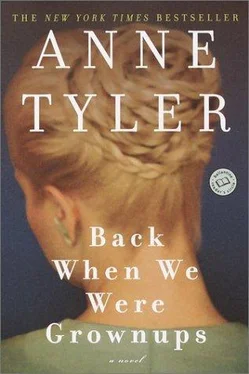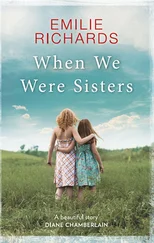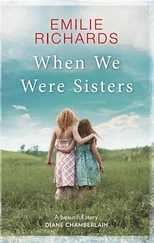Patch was shaking her head again. “Ridiculous,” she said in an undertone to Rebecca.
Rebecca said, “Well, she does have this uncanny way of—”
“Not that, Beck. Although how uncanny could it be, when she fulfilled her own prophecy by immediately writing that note, for Lord’s sake? But do you happen to have any idea when Secretaries Day is ?”
Rebecca said, “Um…”
“It’s in April.”
“April,” Rebecca said, still not comprehending.
“That was barely two months ago! Or less; more like one month, because I think it’s toward the tail end of April. NoNo’s known this man just a month and now she’s up and marrying him!”
Rebecca started to remind her that she wasn’t marrying him till August, after all. But in the lull that had suddenly fallen — with the only sounds the distant river and the chirring of the insects — she worried NoNo was overhearing their conversation. So instead, she picked up a glass of champagne. “Time for our toast, everybody!” she cried.
One by one, they reached for glasses of their own. The children were the most enthusiastic. They raised theirs high above their heads, like people hailing taxicabs. The only exception was Peter, who sat on NoNo’s blanket in a puddle of heather-gray sweatshirt and allowed his glass to dangle limply from one hand.
Rebecca drew in a deep breath and began:
“A toast to the bunch of us gathered together
In this glorious spring weather,
And to Zeb for scoping out the site
And Biddy for cooking with all her might.”
Her rhyming toasts were a tradition. She had no illusions about their literary merit; she knew they were pure doggerel. (More than once, in a pinch, she’d been forced to rely on nonsense syllables— tra la la or tum dee diddle —to finish up a line.) But her family had come to expect them; so she took another breath and went on.
“And most of all, to NoNo and Barry.
We’re so delighted they’re planning to marry.”
“Hear, hear,” the others murmured.
Joey’s glass had a bee on the rim and there was a little to-do, since Joey was deathly allergic; but eventually they did all manage to take their sips. Then Barry said, “Well, thanks, you guys,” and sheepishly rubbed the top of his bristly blond crew cut.
That was the best he could do?
Oh, Rebecca always felt suspicious of the people that her loved ones fell in love with. She worried! She couldn’t help it! But that was her deep, dark secret, because invariably she was the first to rush forward with a warm welcome. Now she raised her glass again. “And next!” she said.
“Next, a toast to Peter!
Someone new in our family!
Nothing could be sweeter.”
“Hear, hear!” they repeated, more loudly now, and Barry said, “Aww,” and raised his glass to Rebecca. “That’s very nice of you,” he told her.
But Peter said, “ I’m not in your family.”
His speaking voice turned out to be high and thin and childish, but it managed to silence everybody.
“I’ve already got a family!” he said.
Rebecca said, “I didn’t mean — I’m sorry! I honestly didn’t mean—”
Peter scrambled to his feet, tossing aside his glass. (It sent out a spray of bright drops before it landed, intact, on the blanket.) His floppy borrowed socks nearly tripped him up, but he righted himself and started running.
Not toward the river, thank goodness. He seemed headed for Barry’s car, although it was difficult to be sure. Rebecca, rising from her bench with her fingers pressed to her lips, thought he resembled one of those charred paper bits that float above a bonfire, gray and weightless, fluttering without aim. As he neared the car he glanced over his shoulder, and when he found Barry ambling behind at a nonchalant pace, he veered to the left without slowing down. In front of him was a green thicket. He plunged directly into it.
“Stop him,” Zeb said suddenly.
Everybody looked at him.
“He’s going toward where the river bends! He’s headed for the water,” Zeb said, and he set off at a lope. “Barry!” he called. “Stop him! He’s about to get wet all over again!”
Barry gathered speed.
Peter entered the thicket and vanished.
A moment later, Barry vanished too.
And that is when the first intimation came to Rebecca from nowhere, brushing across her mind like the most delicate of moth wings.
How on earth did I get like this? How? How did I ever become this person who’s not really me?
That night, she dreamed she was traveling on a train with her teenaged son.
Never mind that she had no son. Never mind that if she had, he would have been a grown man by now. In her dream, she took it for granted that this tall, quiet, gawky young boy belonged to her without question. His hair was the same fair color as hers, except that it hung in a shock to one side. He was thinner than Rebecca had ever been, but he had her gray eyes and sharp nose. And most familiar of all was some quality in his expression, something hopeful and wistful, some sense he felt a little bit outside of things. Didn’t she know that feeling! She recognized immediately the shy, uncertain edginess at the corners of his mouth.
He had the window seat; she had the aisle. He was gazing out at the scenery and so was she, supposedly, but really she was seizing the chance to dwell on his dear profile. She felt a wash of love for him — the deep, pervasive, abiding love you feel for one of your own.
When she woke up she was sorry, and she tried to go back to her dream again but she couldn’t.
* * *
She lay awake in the bed that she had come to as a bride, in the room that she had slept in for over thirty years. For the majority of her life, in fact; so why did she still think of this house as somebody else’s? The Davitches’ house, not hers. The Davitches’ ornate but crumbling nineteenth-century Baltimore row house, with its two high-ceilinged parlors, front and rear, its antiquated backyard kitchen connected to the dining room by an afterthought of a passageway, its elaborate carved moldings and butterfly-parquet floors and seven sculptured marble mantelpieces overhanging seven fireplaces, five of them defunct.
The ground level provided the family’s subsistence; they rented it out for parties. Christenings, graduation teas, wedding receptions, retirement dinners… All of Life’s Occasions from the Cradle to the Grave, as their ad in the Yellow Pages put it. For Your Next Important Social Event, “Experience the Charms of the Open Arms.”
Funny name for such a narrow, shutter-faced house, she’d always thought.
She’d thought it the first time she came here, nineteen years old and dressed head to toe in blue, a heavyset, timid young woman standing out on the sidewalk peering up at the shield-shaped sign. The Open Arms, Est. 1951. Nothing open about it at all, not that she could see. Although possibly she’d been influenced by the fact that parties of any kind whatsoever were her idea of torture.
Oh, life worked out so surprisingly, didn’t it?
The flannel darkness high above her turned white and then transparent, and the birds began to sing in the poplar tree next door, and the grandfather clock downstairs gave off six mournful dong s. Rebecca finally got out of bed and shook her nightgown around her ankles and went over to raise the window shade. It was going to be another sunny day. Chips of blue sky showed behind the rooftops. She watched a traffic helicopter cross the space between two faraway buildings, its propeller a brisk, busy blur above its head.
Читать дальше












